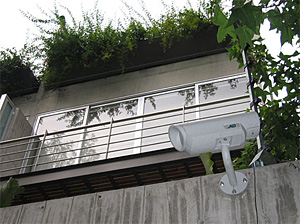 |
 |
 |
 Editorials | Issues | May 2007 Editorials | Issues | May 2007  
Crime Fears Fuel Demand for Security in Mexico
 Chris Hawley - USA TODAY Chris Hawley - USA TODAY


| | A security camera and electric fence protects apartments in a Mexico City neighborhood. High-profile crimes have fed a sense of insecurity in Mexico. (Chris Hawley/USA TODAY) |
Mexico City — The layout of high-tech gadgets was enough to make James Bond jealous.

At a recent security-themed trade fair here, merchants were selling smoke-screen generators and security cameras hidden in pencil sharpeners. There were also portable bomb sniffers, bulletproof doors and tiny tracking devices meant to foil kidnappers.

The targeted consumers were not British secret agents, but Mexicans looking for new ways to protect themselves from crime. The security business is booming in Mexico, as a war between drug cartels and a wave of kidnappings terrify the public.

"I think fear is growing," said Niv Yarimi, sales director for Guibor Private Security, an Israeli-owned guard company that saw its business triple in Mexico last year. "There's a sense that organized crime is three steps ahead of the security services and the police."

Mexico's murder rate has actually dropped by about a third over the past decade, according to the Citizens' Institute for Studies on Insecurity, a crime watchdog group. However, the carnage from the drug war — with a rise in beheadings, grenade attacks and shootouts with high-powered weapons — has convinced many Mexicans they can no longer rely on the police for help.

A jump in housing construction and a drop in the price of security cameras have also helped drive sales of security-related products, as more middle-class Mexicans are able to arm their homes with alarm systems, security companies say.

"People are taking the initiative and doing what they can," said Guillermo Palma, Mexican sales director for the U.S. video security systems maker Pelco. "The culture of the Mexican has changed. (They now say:) 'Why should I wait for something bad to happen to me?' "

Feeding the sense of insecurity is a 2-year-old turf war between the Sinaloa Cartel of western Mexico and the Gulf Cartel of eastern Mexico. Shootouts with assault rifles and grenade launchers have become common in Nuevo Laredo, Acapulco, Monterrey and other points along cocaine smuggling corridors.

President Felipe Calderón has vowed to crack down on the drug gangs. Soon after his inauguration in December, he began sending thousands of troops and federal agents to quell the violence in western and northern Mexico.

"Mexico must not and will not fall into the hands of criminals," Calderón said last month. "We must employ all of the strength of the state to rescue our streets, our parks, our cities, our schools."

Many Mexicans worry Calderón's strong stand will just make matters worse, at least in the short term. About 85% of Mexicans believe the offensive against drug cartels will increase violence, and half believe it will never be controlled, according to a national door-to-door survey of 1,200 people in March by the Parametria polling company. The poll had a margin of error of +/— 2.8 percentage points.

"All the people, we live in a state of panic over what could happen to us," said Karina Ríos Hernández, 22, a barista at a Starbucks in Mexico City. "Everyone blames the government. They can't even guarantee our safety."

Meanwhile, several top law-enforcement officials have been assassinated in Tijuana, Nuevo Laredo, Agua Prieta and other cities. Mexican officials have blamed most of the killings on drug cartels.

At the Expo-Seguridad trade fair last month, at least four companies offered tracking devices meant to counter kidnappers and carjackers. One company, Enlace de Vida, was marketing a wristwatch-style "panic button" that executives can use to summon private security.

Mexico's federal government has tried to respond to crime by installing "urban security systems" — networks of outdoor cameras monitored by computers — in 16 of the country's 31 states.

In Tijuana, the city government has installed over the last two years 320 cameras and 70 microphones tuned to detect gunfire. The violence-riddled state of Tamaulipas, which borders Texas, announced plans in November for a statewide camera system it calls the Northern Border Program.

Soon, even the city's watchdogs will be watched. In January, Mexico City Mayor Marcelo Ebrard announced the city will install cameras in 70 prosecutors' and detective offices to cut down on police corruption. | 
 | |
 |



